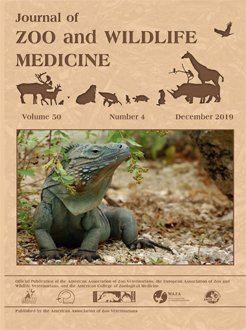Parenteral nutrition (PN) is one method of providing nutrient support to hospitalized, nondomestic ruminants that have a decreased appetite in hospital or have high metabolic demands caused by illness. There are a limited number of published reports of the use of PN in nondomestic ruminants. A retrospective evaluation of PN use in adult (>6 mo of age) hospitalized ruminants at the San Diego Zoo Safari Park was conducted from 2014 to 2018 (n = 24). Discharge rate for animals that received PN was 34%. Poor survival was likely caused by case selection of animals that had severe disease or malnutrition necessitating the need for PN. Common metabolic changes among the study animals included the following: hypokalemia, hyperglycemia, and hyperphosphatemia or hypophosphatemia. Bivariable analysis revealed no clinically significant factors that influenced odds of survival. There was little evidence of adverse effects with the administration of PN during the study period. Parenteral nutrition requires specialized equipment and technical skills, but is a viable means of nutrient support for hospitalized nondomestic ruminants.
How to translate text using browser tools
9 January 2020
RETROSPECTIVE EVALUATION OF THE USE OF PARENTERAL NUTRITION IN HOSPITALIZED NONDOMESTIC RUMINANTS
Lauren M. Mulreany,
Matthew E. Kinney,
Meredith M. Clancy,
Nadine Lamberski,
Stephen R. Werre
ACCESS THE FULL ARTICLE
hyperglycemia
hypokalemia
parenteral nutrition
refeeding syndrome
ruminant





